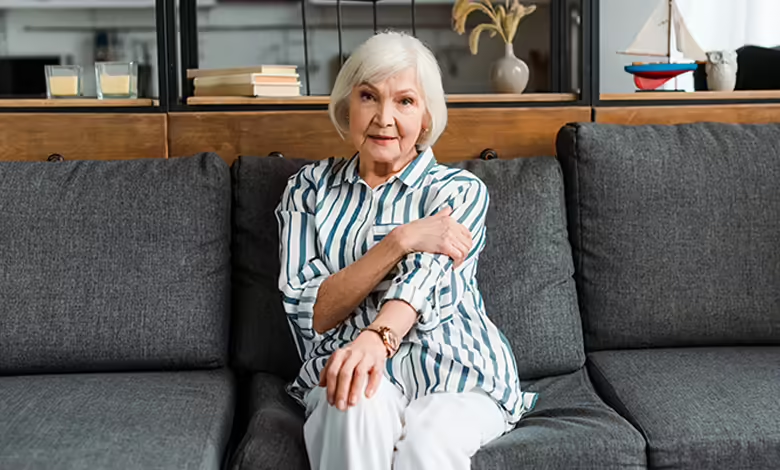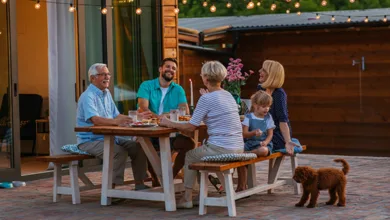
So, you want to remain in your own home, among your familiar surroundings, and in the same neighborhood until you take your last breath—did I get that right?
Your idea has a name: “aging-in-place.” The cornerstone of this approach is bringing products and services into your home as needed.
The desire to remain in your home is understandable. You love your comfy chair with memorabilia that reveals a rich history of who you are and where you’ve been. You rely on the company of nearby friends. And the neighborhood serves you well.
If you need a little help, you can hire someone to mow the lawn and handle other chores. If you live in a two-story house, converting a closet into a first-floor laundry room can significantly improve accessibility. Plus, online grocery shopping has become convenient and easy to use.

But the Reality Is, Aging in Place Has Its Challenges
Aging-in-place is a doable solution for older home dwellers until they find out the hard way that it isn’t. Advertisements enticing residents to remodel homes with grab bars and motorized stair chairs are not helping with their simplistic messaging. Home-share arrangements also present limitations. How many unrelated roommates choose to stick around and play caregiver when the homeowner’s healthcare needs become more than they signed up for?
Are you also counting on family members—son, daughter, grandchild, niece, nephew—to make themselves available if you need assistance? Sadly, recent news articles report that modern-day adult children are pushing back on the notion of caring for aging parents and other elders. Job security, living far away, limited financial resources, and parenting responsibilities are some reasons sons and daughters choose to say no to family caregiving.
Numerous invisible landmines might also be standing between you and your desire to age in place. Limited eyesight and hearing, arthritis, memory problems, and side effects from medications, among other shortcomings, carry with them the potentially dangerous consequences of living at home alone.
Whatever the odds of remaining home alone forever, the time to start planning is now.

Whether you are planning for yourself or helping aging parents fulfill their desire to stay in their homes for as long as possible, take a look at the following questionnaire from my book, “The Complete Eldercare Planner, 4th Edition.”
Questions to Consider If You Want to Age In Place:
- Are you prepared to be an employer? For example, if the care worker you hired doesn’t show up, are you up to the hiring and firing of paid workers? What personal safety precautions are in place for you to allow strangers into your home? Another concern is that the tax implications of hiring workers are complicated.
- Will the money well run dry? You can get almost any type of help you need in your home — for a cost. What are the going rates for home-delivery services, yard work, housecleaning, grocery shopping, and private nursing?
- Is forgetfulness a problem? Not remembering to take medications or turn off the stove could have serious consequences. Will installing monitoring and reminder systems be enough to keep you or your loved one safe? Will forgetfulness put them at greater risk of being taken advantage of financially and otherwise?
- What’s for dinner? Eating nutritious meals is extremely important to sustaining health and independence. Are affordable restaurants located nearby? Are neighborhood meal-delivery programs available? Are group meals available at the local senior center?
- Is illness in the forecast? Chronic conditions like diabetes or arthritis complicate daily self-care and personal hygiene routines. What’s the overall plan for increased medical attention and pain management?
- How will you or your loved one get around town? On-demand transport services and public transportation allow anyone to get anywhere they want to go. Are affordable transport options readily available in the neighborhood?
- Will isolation set in? Some people like to be alone, but for many, staying home alone for long periods is an incredibly lonely and isolating experience. Do friends live nearby? Will people visit regularly? Is depression a concern?
- Is the home wired up? Technology and tech-enabled services can help keep solo home dwellers safe and connected. Is there sufficient Wi-Fi service that you can count on? What’s the backup plan if internet services shut down?
Seek Advice
Before you settle in, seeking advice from housing professionals who can provide perspectives on the bigger picture is advisable. There are various experts you can consult. The CC Young Senior Living staff can offer insights on how best to remain in your home. Additionally, inquire about home- and community-based services that might benefit your situation. Getting guidance from these professionals can help you make informed choices about your living arrangements.
With forethought and planning, it is possible to age in place. What’s important is for you and those who care about you to ask yourself the right questions and do the work ahead of time to make home-sweet-home a reality for the long term.






